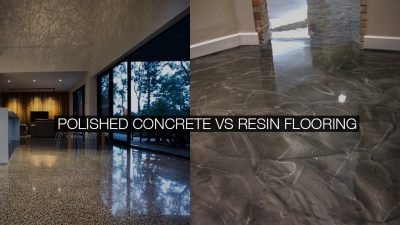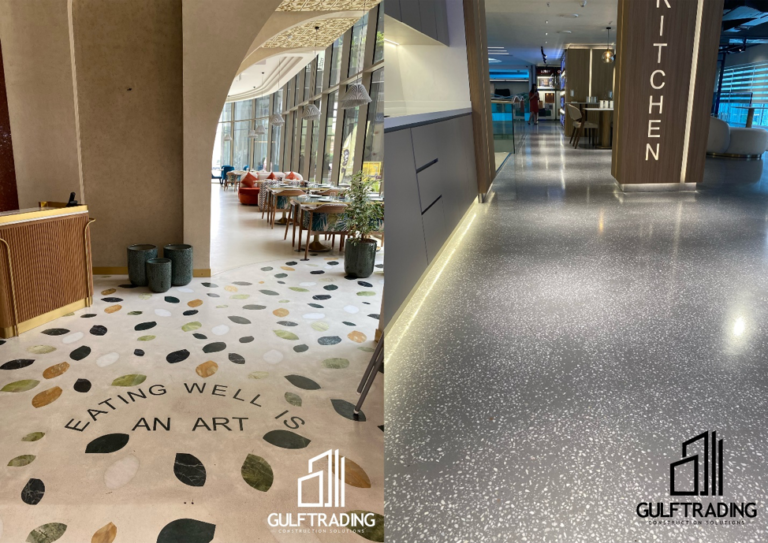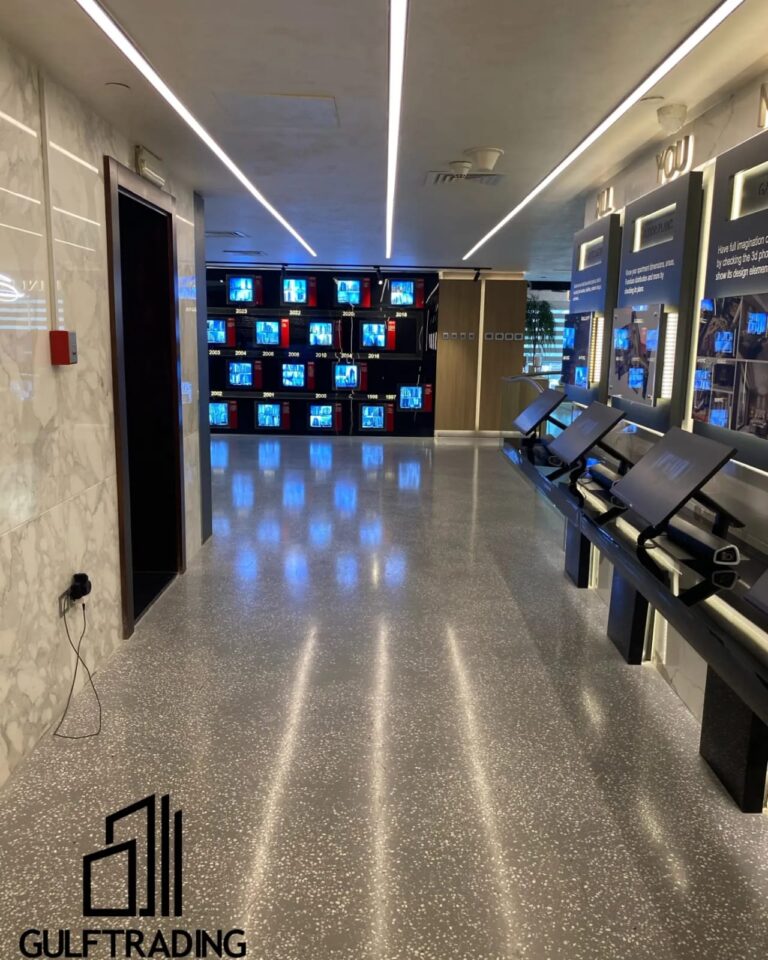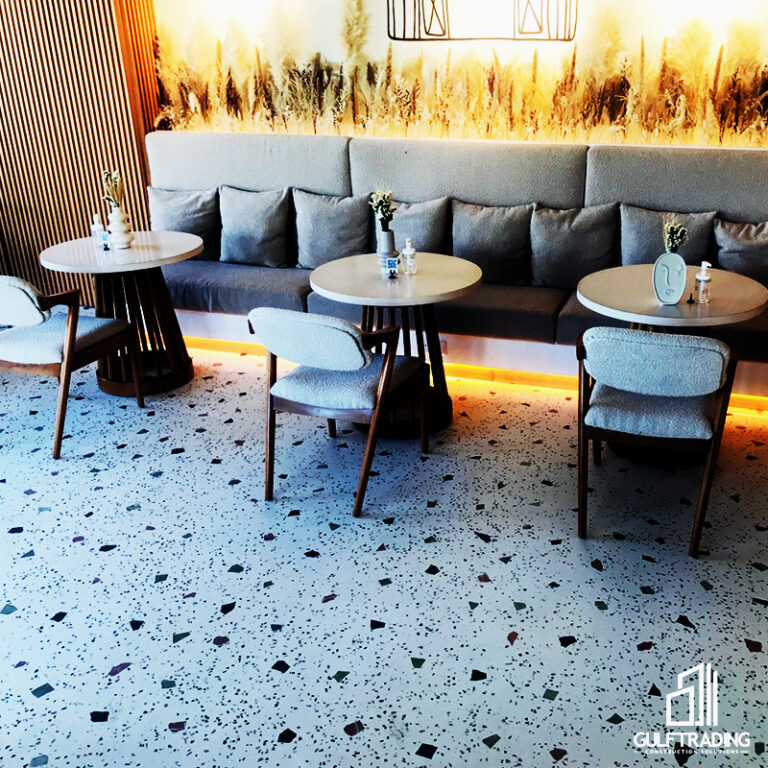Currently have an upcoming project and are struggling to find the right flooring product to select? Whether it is a commercial, F&B, retail or residential project, our comparison between both polished concrete & resin flooring will at least put some clarity in place for you so you can make a well informed decision.
In the world of flooring, polished concrete can be considered a ‘new kid in the block’, as it has recently gained a lot of popularity. This is due to improved grinding techniques that allow for much better floor finishes along with polishable applications. Also, another reason for its popularity is because of the fact that it is well suited to high foot traffic environments where it is used extensively in both commercial and industrial facilities.

No doubt polished concrete is a great alternative to many traditional sorts of flooring options but how does it stack up against seamless resin flooring alternatives? Designers need to assess and weigh different options to understand which one would be a better solution for their projects.
Seamless resin flooring can provide one of, if not, the best commercial flooring option in terms of durability and lifecycle cost saving. Epoxy, polyurethane and MMA are three of the most common seamless resin materials.
This seamless epoxy terrazzo was created using a variety of aggregates of different color and shapes. This was mixed in with epoxy and later grounded and polished to create this work of art.
A project, whether it is for retail, commercial, hospitality or leisure, certain criteria pertaining to the floor finishes has to be kept in mind; appearance, functionality, project budget and construction constraints to name a few. Hence, we will keep in mind both pros and cons of each type of flooring and give our 2 cents as to which one is better.
Let’s kick start this with Polished Concrete
Polished concrete is a concrete floor that has been chemically treated, grounded down to a smoother shinier finish by the use of finer grinding diamonds.

With the polished concrete floor, you can achieve a super flat and highly glossy finish on the surface that is not only durable but long lasting and easy to clean. Also the lifecycle cost of this is typically 60% less compared to other floor coverings.
Pros:
- Polished concrete is hard wearing by nature and can result in floor being used for long periods of time without getting scratched, chipped or dented.
- It’s easy to clean the surface of polished concrete and keep the floor more hygienic as it does not support mold growth. The only thing that is required is warm soapy water for weekly washes. This results in saving time, energy and effort as compared to other floors that require waxing and sealers.
- Health associations have endorsed usage of polished concrete floors as they prevent build up of allergens as compared to carpet.
- Using polished concrete certainly qualifies the building for LEED credits as it eliminates extra carbon footprint incurred by the use of manufacturing, transporting & installing additional materials.
Cons:
- The condition of the existing concrete determines if the polished concrete should be done or not. Issues such as cracks, delamination and dusting can be repaired, however if the substrate is too far gone then concrete will either need to be replaced or another overlay has to be applied on top.
- If the concrete has poor tolerance level, it results in more difficulty to polish the surface. Additional labor and exposed aggregates are the result of that.
- Polished concrete is susceptible to moisture and require to be properly sealed. If liquid seeps in the pores of the concrete, this could cause mold and mildew to grow and if the liquid freezes then this could cause cracking in the slab.
- Concrete expands and contracts with differences in temperature and these fluctuations are the reason for cracking on the surface.
Now let’s head over to Resin flooring
Resin flooring has many different variations but the most common are- Epoxy & Polyurethane.
Epoxy flooring has certainly been a popular form of flooring alternative for a lot of various industries and the main reason is because of a wide range of colors and formulations available.

Epoxy Pros:
- Epoxy is a durable surface that is functional, easy to clean, hygienic & easy to maintain.
- Epoxy can be vapor permeable, low odor and cost effective.
- They can be used for a wide range of applications and with a plethora of colors no wonder they are perfecto resin terrazzo and metallic epoxy!
Epoxy Cons:
- Water based epoxy although with a low cost tag come at the expense of low life span and need to be coated after 2-3 years.
- Epoxy has a slower cure rate as compared to polyurethane
- Epoxies usually require 2 coats to remove porosity.
Polyurethanes are at the more durable, robust and thicker end of the resin flooring spectrum. Depending on the application and system, polyurethane can be applied as flow smooth self-leveling or trowel applied mortar.

PU Pros:
- PU is considered to be extremely durable once it bonds with concrete. This solid chemistry between the two makes it a robust and extremely hard wearing flooring option.
- Easy to clean & long lasting
- They are UV resistant & able to withstand any shrinking or contraction within the surface. Making it the ideal solution for places such as schools or hospitals.
PU Cons:
- The cost of the system usually deters designers and architects from using this product. However, it has to be noted that this can last for long period of time with a plethora of colors.
Decision Time!
So, what will you choose? Resin or Polished Concrete? Based on the comparison above, it is clear that resin definitely comes out on top. Please get in touch with us so our experts can guide you on both systems.





